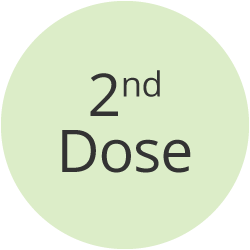Vaccine (Shot) for Hib

How to Pronounce Haemophilus influenzae: Listen [MP3]
Three doses or four doses, depending on the brand, of a Hib vaccine are recommended for children by doctors as the best way to protect against Hib disease.
When should my child get a Hib shot?
One dose at each of the following ages:
Why should my child get a Hib shot?
- Protects your child from Hib disease, which can cause lifelong disability and be deadly.
- Protects your child from the most common type of Hib disease, meningitis (an infection of the lining of the brain and spinal cord).
- Keeps your child from missing school or child care, and you from missing work.
Hib shots are safe.
Hib shots are safe and effective at preventing Hib disease. Vaccines, like any medicine, can have side effects. These are usually mild and go away on their own.
What are the side effects?
Most children don’t have any side effects from the shot. The side effects that do occur are usually mild, and may include:
- Redness, swelling, warmth, or pain where the shot was given
- Fever
Prepare for your child's vaccine visit and learn about how you can:
- Research vaccines and ready your child before the visit
- Comfort your child during the appointment
- Care for your child after the shot
What is Hib disease?
Hib disease is a serious illness caused by bacteria called Haemophilus influenzae type b (Hib). Babies and children younger than 5 years old are most at risk for Hib disease. It can cause lifelong disability and be deadly.
What are the symptoms of Hib disease?
There are many types of Hib disease. Symptom depend on the part of the body it affects.
The most common type of Hib disease is meningitis. It causes:

- Fever
- Headache or stiff neck
- Nausea with or without vomiting
- Eyes being more sensitive to light
- Confusion
- Poor eating and drinking, low alertness, or irritability (in babies)
Hib disease can also cause:
- Pneumonia (lung infection)
- Throat swelling that makes it hard to breathe
- Infections of the blood, joints, bones, and covering of the heart
Is it serious?
Hib disease is very serious. Most children with Hib disease need care in the hospital. Even with treatment, about 1 in 20 children with Hib meningitis dies. As many as 1 in 5 children who survives Hib meningitis will have brain damage or become deaf.
Follow the vaccine schedule
The Centers for Disease Control and Prevention, American Academy of Family Physicians, and American Academy of Pediatrics strongly recommend children receive all vaccines according to the recommended vaccine schedule.
- Get a list of vaccines that your child may need based on age, health conditions, and other factors.
- Learn the reasons you should follow the vaccine schedule.



